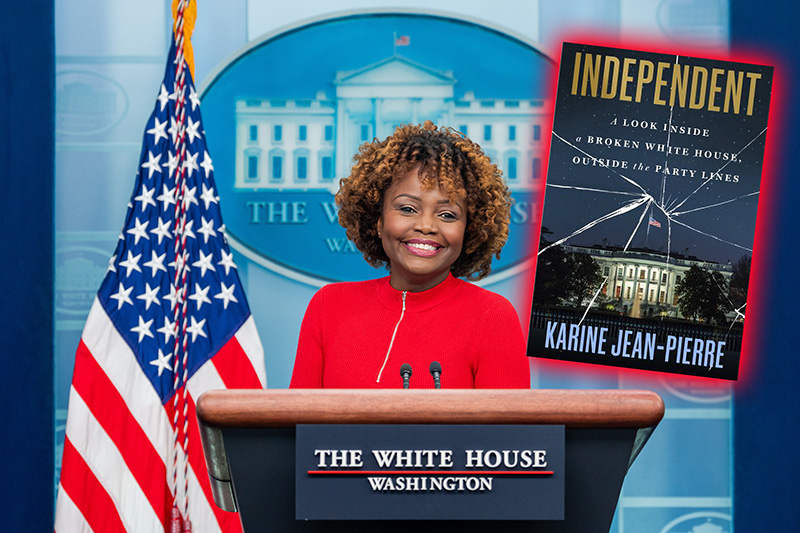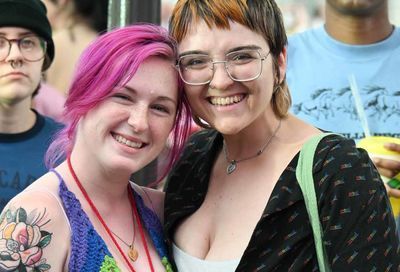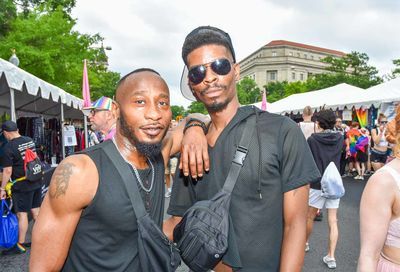LGBTQ Candidate Spotlight: Dionne Reeder says she’ll be a true independent voice on the Council
At-Large candidate says she'd bring different perspectives to the Council as both a businesswoman and as a community activist

This article is part of a series highlighting local LGBTQ candidates running in the 2018 elections. The opinions and political beliefs expressed in this candidate spotlight do not necessarily reflect those of Metro Weekly, its employees, or its contributors.
“If you ask my older sister, she’ll tell you the only thing I’ve ever wanted to be was the President of the United States,” laughs D.C. Council candidate Dionne Bussey-Reeder. “So that spirit was always kind of in me. But lately, with the changes in government, I just feel that things are not happening in a way that positively affects all of D.C. After a while, you realize that in order to really be effective, you have to be able to change or effect policy, and this was really an opportunity for me to do so.”
Reeder, a 47-year-old restaurateur who’s seeking one of two At-Large seats on the Council, has largely been cast as the candidate of the business community, but prefers to tout her work as a community organizer instead.
“Interestingly enough, I’ve done less business work than I’ve done community organizing and activist work,” she says. “The one portion of my life that’s probably had the least amount of my time has become the most glorified, and that’s just not true of who I am.
“I’ve actually had legislative experience. I’ve worked on Capitol Hill. I worked and developed young people with college prep opportunities,” she adds. “I worked in government as a grants manager over a $9 million dollar local law enforcement block grant that curbed youth violence. I worked as one of Mayor Anthony Williams’ senior advisors of Ward 8. I worked as a deputy director for one of the largest nonprofits in the southeast for 14 years.
“”I’ve been doing this work, in terms of community development, really working in the trenches with residents across the city, really working to empower them, provide opportunity to them to be self-sufficient.”
That said, Reeder says the Council could benefit from having a businesswoman’s perspective, which would be unique among a Council where many members are lawyers and career politicians.
“I understand the importance of making payroll, hiring D.C. residents intentionally, understanding the woes, the ups and the downs of the business community,” she says.
She also notes she’d bring a unique perspective as the Council’s sole member of the LGBTQ community, if elected — and an open and proud LGBTQ person at that.
“On this campaign trail, people have said to me, as a lesbian, that I shouldn’t say that I’m a lesbian,” Reeder says. “And I’ve wondered, ‘What do they want me to do with my wife?’ Hide her for the four years? And we’ve been together for 19.
“[Some] people still have in their mindset that it’s better to be hidden than to be who you are,” she adds. “I don’t want to do that.”

One of Reeder’s top priorities, should she be victorious, is to dispel the myth held by some District residents that their elected councilmembers are unreachable or inaccessible.
“I’ve been a community advocate, and I’ve been in the trenches with people who have been the most marginalized by the growth of this city,” she says. “And I’ve also had the pleasure of being in communities where people have benefited by the growth of the city. And if you talk to them both, the reality is they don’t see the council as people that they can connect with. So immediately, my platform would really be connecting with the community, and that’s the entire community.”
Legislatively, Reeder is in favor of freezing property taxes for people who have lived in the District for 15 years or more.
“Property taxes have increased by almost up to 10% in one year. Some of our senior populations who have been the fiber of our city actually now pay more in property taxes than they do on their mortgage,” she notes. “And I believe in a city that has the level of revenue that we have, that’s an injustice.”
Reeder also says she’d make the District and the federal government pay their fair share of the water assessor tax. And she would encourage high schools to offer vocational and technical tracks for students who don’t wish to pursue higher education, in order to ensure they are employable when they graduate.
When it comes to education, Reeder is concerned about the achievement gap that exists between students in D.C. Public Schools. That divide is particularly stark along racial and economic lines, with children of color and those from lower-income families not receiving the same quality education or opportunities as their white and more affluent counterparts. Even though DCPS is under control of the mayor, Reeder believes the Council needs to take a more proactive role in providing oversight.
“We have young people that are graduating from high school and cannot read. That’s across the city. I think we need accountability on every front,” she says. “There should not be children living in one part of the city being bused to another part of the city for a better education opportunity. That’s what I consider to be an injustice.”
Reeder says the District also needs to alter its approach to affordable housing.
“I live in Columbia Heights. I live in the house where I grew up. The reason why I’m able to live in the house where I grew up is because my parents, 42 years ago plus, purchased that house through a rent-to-own option,” she says. “We have very little of them now. That’s one solution.
“When I’m talking about working families, I’m talking about families who — and don’t get me wrong, this isn’t a perfect solution, because we have many families that fall below making $45,000 — but those families who make between 50 and 80 thousand and still struggle,” she adds. “I believe if you make that amount of money in the city, we should create affordable opportunities for you to be able to rent, put money into escrow, and own your house, because that’s generational wealth.”
When it comes to fiscal responsibility, Reeder feels she is uniquely qualified to provide oversight of government agencies, and, even more importantly, explain to the average D.C. resident where and how their tax dollars are being spent. She advocates opening up the budget amendment process to the public as a way of providing greater transparency.
“Quite frankly, many residents are disengaged because they don’t know what’s going on, and it doesn’t relate to them,” she says. “The budget is this big, so even with the summary, the language is speaking over their head. It’s like: ‘Where does this go and how does it affect me or my bottom line?'”
Reeder would be amenable to providing residents an online website that explains the budget process and the city’s spending priorities, but she also believes it would be her duty to hold neighborhood summits, as former Mayor Anthony Williams used to do, to break down how taxpayers’ money is being spent and which communities are benefitting from the programs that the District chooses to fund.
“Let’s take some of our hearings out of the Wilson Building,” she says. “People feel more engaged when we bring the ivory walls and ivory towers to the community where it actually matters.”

Most notably, Reeder is being backed by Mayor Muriel Bowser (D) in a race that pits her against incumbent Councilmember Elissa Silverman for a single At-Large seat.
The press and some political observers have made much of the issue, often citing the Reeder endorsement as an example of the mayor trying to exert influence over the Council. But Reeder chafes at the idea that she’ll be a rubber-stamp for the mayor’s agenda.
“When we sat down to discuss the endorsement, I said to her, ‘Mayor, I will not always agree with you, but you do not have to agree to do what’s best for the residents for the District of Columbia,’ and we shook hands. I’m always going to be an independent voice. I have my integrity to stand on, and I will leave any job — even this one — if I am forced to compromise who I am.”
That said, Reeder does not expect to be a councilmember for life, saying she believes in term limits and thinks eight years is enough for a politician to have an influence over city affairs.
“I don’t plan on being a council member forever,” she says. “I want to get in there, do what’s best, be able to train another person to take over the mantle, and then move on to whatever next God has planned for me.”
Support Metro Weekly’s Journalism
These are challenging times for news organizations. And yet it’s crucial we stay active and provide vital resources and information to both our local readers and the world. So won’t you please take a moment and consider supporting Metro Weekly with a membership? For as little as $5 a month, you can help ensure Metro Weekly magazine and MetroWeekly.com remain free, viable resources as we provide the best, most diverse, culturally-resonant LGBTQ coverage in both the D.C. region and around the world. Memberships come with exclusive perks and discounts, your own personal digital delivery of each week’s magazine (and an archive), access to our Member's Lounge when it launches this fall, and exclusive members-only items like Metro Weekly Membership Mugs and Tote Bags! Check out all our membership levels here and please join us today!


























You must be logged in to post a comment.